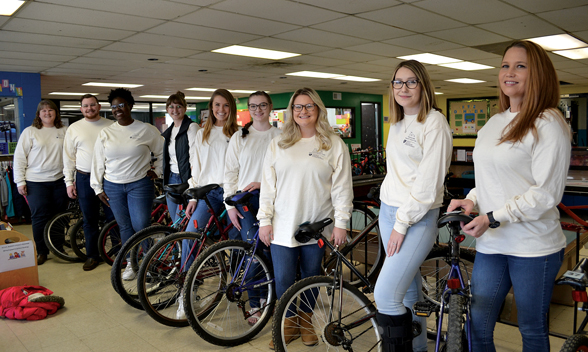ETSU College of Public Health’s RE:CYCLING project provides bikes, safety tips to kids
Published 11:34 am Tuesday, December 3, 2019

- Contributed Photo College of Public Health students with bikes.
JOHNSON CITY — Faculty and students from East Tennessee State University’s College of Public Health donated 33 refurbished bicycles to community children at the Boys & Girls Club of Johnson City/Washington County on Thursday, Nov. 21.
The children were allowed to “test drive” the bicycles and then submit their names into a drawing for the bicycle of their choice.
The program is known as the Re-engineering: Contributions to Youth Charity and Learning Innovation and New Idea Generation (RE:CYCLING) and consists of two parts — refurbishing bicycles for local children and using bicycles to design “machines” that can improve the quality of life in low resource areas.
The bicycles used in RE:CYCLING were donated by the Johnson City OmniSource location. OmniSource Corporation is one of North America’s largest processors and distributors of scrap and secondary metals. They collect, process, resell, and trade a wide variety of ferrous and nonferrous scrap.
The program is led by Dr. Mike Stoots, director of operations for College of Public Health programs at the ETSU Eastman Valleybrook campus, and Aimee Rowe, senior lecturer, Department of Community and Behavioral Health.
The program partners with several organizations within and outside of the College of Public Health. The Public Health Student Association donated helmets for each bicycle received, and presented a bicycle safety program for the Boys & Girls Club members. Norris Bicycles discounted tools and supplies and examined all bicycles for functionality and safety before donation.
“Our goal today is that the kids have fun and leave with a knowledge of bike safety,” said junior Olivia Barnes. “We have skits, education points and a game to help them learn hand signals, where to ride, when to ride, proper attire and the danger of using electronics while riding.”
In addition to promoting physical activity for the region’s children, public health students learn the hands-on skills necessary to renovate or refurbish the donated bicycles.
“At Eastman Valleybrook, we focus on many ways to use recyclable materials,” Barnes said. “We are doing a lot with very little and learning how to work in low-resource settings.”
In another phase of the RE:CYCLING program, bicycles are repurposed to address public health challenges. To date, re-purposed bicycles have been converted to spinning wheels, an electricity-free washing machine and several hand-operated water pumps. Re-purposing bicycles helps teach public health students how to develop sustainable approaches to meeting the needs of people living in low-resource areas.
Barnes, who is in the Community and Behavioral Health concentration, said the hands-on opportunities at Eastman Valleybrook are extremely valuable.
“In classes, you gain a lot of information, but the actual implementation of that knowledge before you go out in the workforce is so important,” Barnes said.
Junior Rebecca Blevins, who hopes to work with children in a public health setting, agrees.
“My concentration is Community and Behavioral Health, so I appreciate opportunities like this to get into the community and get an idea of the population we’re going to serve after graduation.”
All phases of the RE:CYCLING program take place at the ETSU Eastman Valleybrook Campus, which is the location of the College of Public Health’s Project EARTH. To date, more than 100 bicycles have been donated to the Boys & Girls Clubs.





